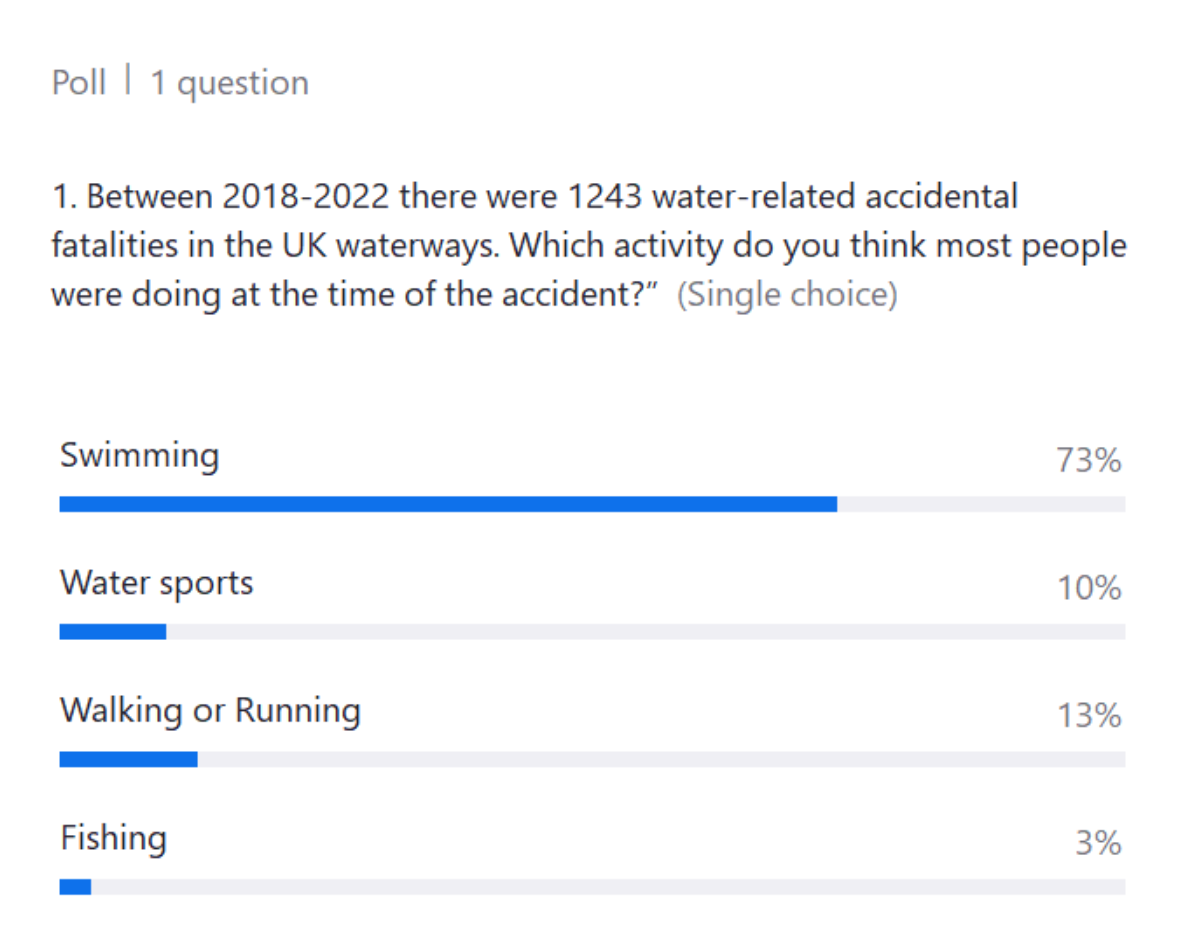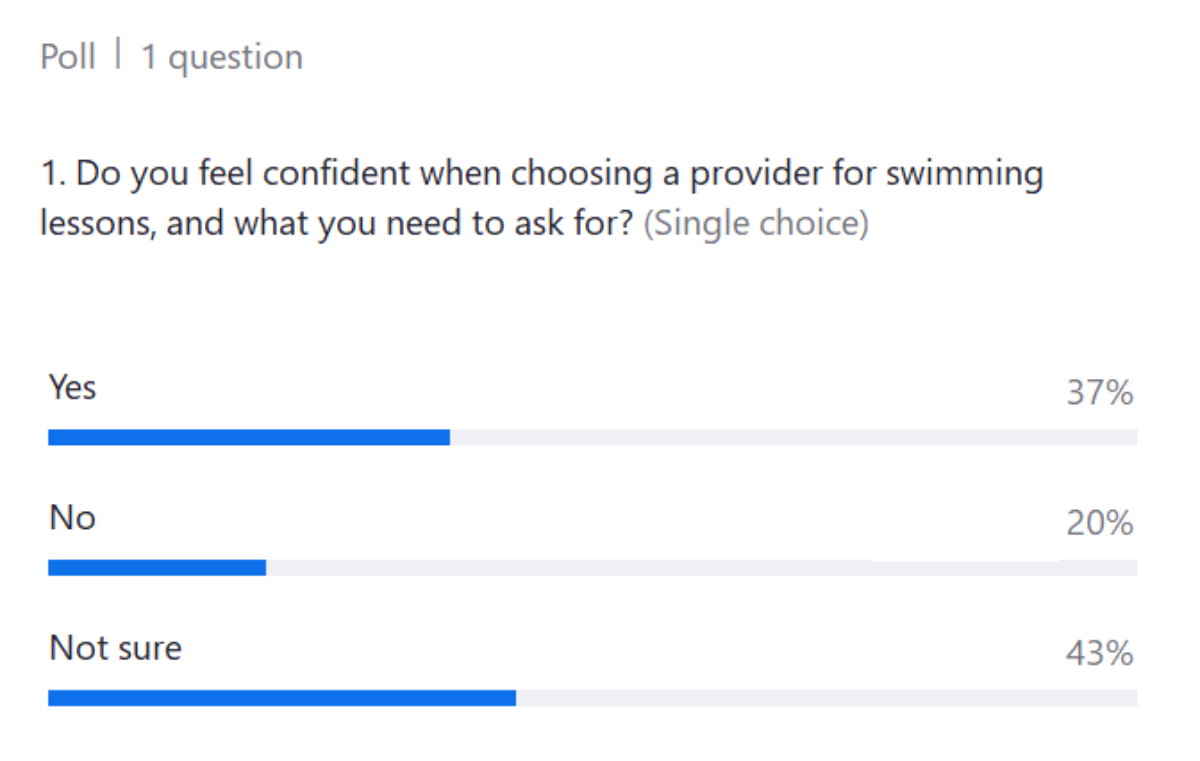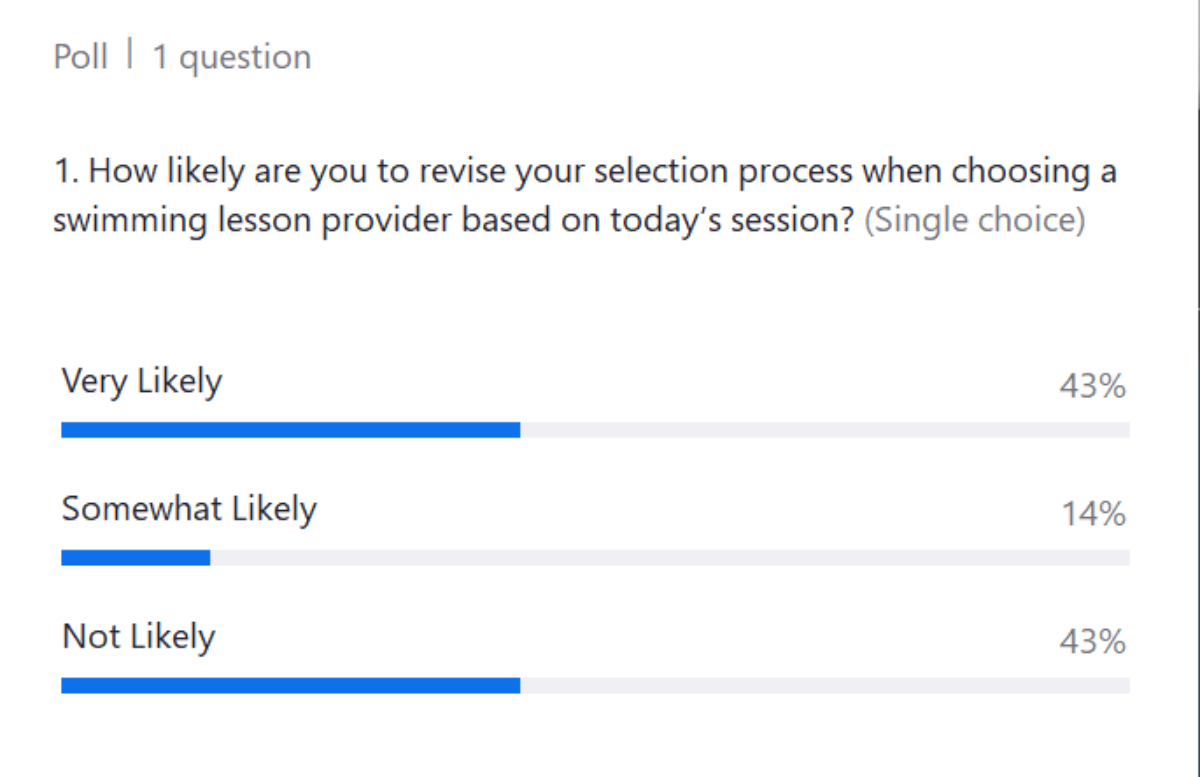Splash with Confidence: Safety Essentials for Swimming in Schools

This blog is based on Judicium’s Health and Safety ‘Sofa Session’ from the 2nd of July, with our resident expert Jonathan Friend and India Cottenden.
Poll 1

Fast Facts: Water Safety in the UK
1,243 accidental water-related deaths have occurred across UK waterways in the past five years.
35% of victims had no intention of entering the water—most were simply walking or running nearby.
Child fatalities rose by 46%, with 35 children drowning in 2022 alone, many unintentionally.
Only 70% of Year 7 students in 2023–24 could swim 25 meters unaided—a National Curriculum target that’s been steadily falling.
Contributing factors include missed swimming lessons during the pandemic, rising pool costs, and declining access to water safety education.
What are the other benefits to those completing swimming lessons?
Confidence building.Social development.
Health benefits.
Enabling participation in water-based activities, such as surfing, kayaking and snorkelling.
Supporting inclusion for children with additional needs.
Poll 2

Due Diligence: Choosing A Swimming Provider
Certifications: Look for instructors certified by recognised bodies (e.g., Red Cross, STA, ASA, or Swim England). Pools deeper than 1.5 metres (approximately 5 feet) require a qualified lifeguard with a NPLQ from RLSS UK.
Experience: Ask about their experience teaching different age groups and skill levels.
First Aid & CPR: Ensure they are trained in lifesaving and emergency response.
Facility Standards
Cleanliness & Maintenance: Pool water should be tested at least twice daily, or more frequently in busy pools. Chemical balance and hygiene should meet national safety standards.
Red Flags when Choosing a Swimming Provider
- Lack of proper certification or proof of qualifications.
- No evidence of CPR or first aid training.
- Vague or disorganised lesson plans.
- Overcrowded lessons.
- Poor facility hygiene, (e.g dirty water, mould, strong chemical smells).
- Broken or outdated equipment.
- Defensive or dismissive responses to feedback.
- Vague or missing policies on cancellations, make-up lessons or refunds.
- High-pressure sales tactics without trials.
Top Tips for Productive Swimming Lessons
- Curriculum and Teaching Approach: Ask if they follow a structured curriculum with clear progression. Observe a class, if possible, to see how instructors interact with students.
- Class size recommendations: Use the guidance from the Safe Supervision of Programmed Swimming Lessons and Trained Sessions (2018)
- 12:1 for non-swimmers.
- 20:1 for improving or competent swimmers.
- 1:1 for tailored or SEND swimmers.
- Reviews and Reputation: Check Google, Yelp, or local forums for feedback. Ask friends, family, or local parenting groups for recommendations. Look for testimonials or case studies of student progress.
- Pricing and Transparency: Ensure fees are clear and there are no hidden costs. Understand their policy on cancellations and trial periods.
Poll 3

Understanding Your School's Legal Responsibilities
Non-Delegable Duty of Care
The UK law states that schools cannot offload responsibility by outsourcing. Even if a school hires an independent contractor (e.g., a private swimming instructor or external sports coach), the school remains legally responsible for the child's safety. If the contractor is negligent, the school can still be held liable under this non-delegable duty.
Case Study 1: Woodland Vs Essex County Council
A pupil (Woodland) suffered a severe brain injury during a school swimming lesson. The lesson was conducted by an independent contractor hired by the school. The claim was that the school owed a non-delegable duty of care to ensure the pupil’s safety, regardless of who provided the instruction.
The court held that the school did owe a non-delegable duty of care. Lord Sumption outlined five key features that typically give rise to such a duty:
Vulnerability: The claimant is especially vulnerable or dependent on the defendant’s protection.
Pre-existing Relationship: There is a relationship that places the claimant in the defendant’s custody, charge, or care.
No Control: The claimant has no control over how the defendant chooses to perform the obligations.
Delegation: The defendant has delegated a function integral to the positive duty assumed.
Negligence: The third party has been negligent in performing that function.
In this case, the Supreme Court ruled that the local education authority (Essex County Council) was liable for the negligence of an independent swimming instructor. The court emphasised that the child was under the school’s care.
Key Implications
- Vet third-party providers thoroughly.
- They should ensure adequate insurance is in place.
- Monitor and supervise outsourced activities.
- Have clear contracts outlining safety expectations.
Case Study 2: The Kyra Hill Case (Liquid Leisure, Berkshire)
In August 2022, 11-year-old Kyra Hill tragically drowned at Liquid Leisure water park. The inquest concluded in May 2025 with the following key legal findings:
The coroner ruled her death "unlawful killing," citing gross failures in health and safety.
Inaccurate depth signage.
There was no emergency response plan in place.
Inexperienced lifeguards.
Murky water impending search efforts.
Key safety considerations when managing your school’s pool
Under the Health and Safety at Work etc. Act 1974, every pool operator is responsible for the health and safety of employees, pool users and other people on the premises. The Management of Health and Safety at Work Regulations and others place general obligations on pool operators.
Why Every Swimming Pool Needs a Pool Safety Operating Procedure (PSOP)
A PSOP is a legal and operational requirement for all swimming pools in the UK. It plays a vital role in ensuring the safety of swimmers, staff, and visitors. PSOP includes two parts:
- Normal Operating Procedure (NOP) – day-to-day operations and safety measures
- Emergency Action Plan (EAP) – what to do in emergencies
Common PSOP Mistakes Include:
- Outdated information.
- Staff or emergency contacts that are incorrect.
- Use of generic templates which increases risk and fails to address unique hazards.
- Vague emergency procedures.
- Lack of staff training and limited access to PSOP.
Why it's Essential:
- Legal Compliance.
- Staff Training and clarity on roles and responsibilities.
- Protect Vulnerable Users: Children, non-Swimmers, people with disabilities.
Top Tips to avoid Swimming Accidents
- Active Supervision Always - Whether swimming takes place on-site or off-site, ensure designated ‘water watchers’ are always present—adults solely focused on monitoring swimmers, regardless of skill level.
- Prioritise Physical Safety Measures - For schools with their own pool: maintain secure barriers (minimum 1.2m), self-latching gates, and pool alarms. For external providers: verify their facility meets these standards before use.
- Promote Water Confidence and Education - Ensure basic water safety is taught regularly, and that all students receive structured swimming instruction—either through your own programs or trusted providers.
- Enforce Safe Diving Practices - Clearly mark no-diving zones and only allow diving in depths of 2.5m or more, whether in school pools or during external sessions.
- Keep Surroundings Hazard-Free - Ensure pool areas remain tidy, with non-slip mats and no loose items. If off-site, inspect or request a safety audit of their environment.
- Maintain Equipment and Facilities - Routinely check drains, ladders, and filters for damage. Confirm that suction covers are securely fitted—whether maintaining your own pool or verifying outsourced facilities.
- Be Ready for Emergencies - Have a fully stocked first aid kit and visible lifesaving equipment. Make sure all staff or supervisors (in-house or external) are CPR-trained and confident in emergency response.
Judicium Education can help
Swimming safety is not optional its essential. If your school needs support, to ensure your schools programme is legally compliant, we’re here to help.
Judicium Education’s Health and Safety Advisory Service is designed to support schools, firstly, in ensuring a safe working and learning environment, secondly, in complying with the legal requirements imposed on them as employers under the various Health & Safety laws and regulations. For more information, please visit here.
If you require any support in any of these steps or would like to talk to someone surrounding some support for your school or trust, please do not hesitate to call us on 0207 336 8403 or email Georgina.decosta@judicium.com.
If you’d like to review Judicium’s forthcoming sofa sessions please click here
© This content is the exclusive property of Judicium Education. The works are intended to provide an overview of the sofa session you attend and/or to be a learning aid to assist you and your school. However, any redistribution or reproduction of part or all of the contents in any form is prohibited. You may not, except with our express written permission, distribute or exploit the content. Failure to follow this guidance may result in Judicium either preventing you with access to our sessions and/or follow up content.
Related content

This prestigious award celebrates our commitment to delivering expert, education-specific Health & Safety support that lifts the burden for school teams while raising safety standards across the sector.

This blog is based on Judicium’s Health and Safety ‘Sofa Session’ from 18th June, led by resident expert , Mike Wright, CMIOSH. This session focuses on the control of substances hazardous to health (COSHH) and their relevance in school settings, how assessments should be undertaken and what staff could be at risk.

Discover why Judicium has been shortlisted for Fire Safety Consultancy of the Year at the 2025 FSM Awards, recognising our expert support for schools and trusts in delivering sector-specific, compliant, and practical fire safety solutions.
.png)
This blog is based on Judicium’s Health and Safety ‘Sofa Session’ from the 12th of March, with our resident expert Mike Wright.

This blog is based on Judicium’s Health and Safety ‘Sofa Session’ from the 26th of February, with our resident expert Loretta Igbe.

This blog is based on Judicium’s Health and Safety ‘Sofa Session’ from the 8th of January, with our resident expert Jim Liddy.

H&S